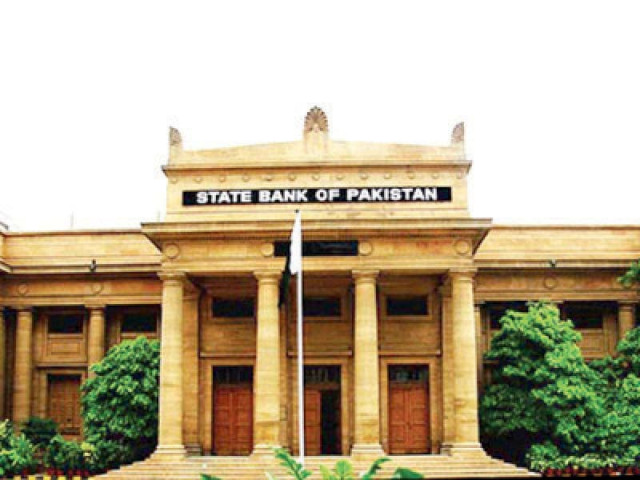SBP jacks up interest rate to 12.25%
Central bank moves after local currency hits historical low level of Rs189.51 against US dollar

Taking cues from global and domestic developments, Pakistan's central bank on Thursday jacked up the benchmark interest rate by a massive 250 basis points to a two-year high at 12.25% during an emergency meeting.
It has been learnt that the sharp increase of 2.50 percentage point in the rate was seen after a gap of over two-and-half decades.
The State Bank of Pakistan (SBP) came into action for the rate hike amid the domestic currency making a sudden and colossal drop of almost 2% (or Rs3.39) and hitting a historical low level of Rs189.51 against the US dollar in intra-day trading in the inter-bank market.
The rate hike would indirectly extend its support to the rupee to partially recover ground against the greenback.
Later on, the local currency closed the day trading at Rs188.18 against the greenback in comparison with Rs186.13 a day earlier-- showing a decline of 1.09% (Rs1.05) on a day-to-day basis.
The domestic political uncertainty, elevated global commodity prices mainly the crude oil price in the wake of Russia-Ukraine war, significant drop in country's foreign exchange reserves and US Federal Reserve hints for strong upward revision in its benchmark interest are some of the global and domestic developments which agreed authorities concerned to increase the interest rate and let the rupee plunge under the automatic and flexible exchange rate mechanism.
Besides, the large current account deficit and elevated inflation reading compelled the central bank to jack up the key policy rate.
"Since the last MPC [monetary policy committee] meeting held on March 8, the outlook for inflation has deteriorated and risks to external stability have risen," the SBP said in its monetary policy statement on Thursday.
Externally, futures markets suggest that global commodity prices, including oil, are likely to remain elevated for longer and the Federal Reserve is likely to increase interest rates more quickly than previously anticipated, likely leading to a sharper tightening of global financial conditions, the central bank elaborated.
On the domestic front, the inflation outturn in March surprised on the upside at 12.7%, with core inflation in both urban and rural areas also rising significantly.
While timely demand-moderating measures and strong exports and remittances saw the February current account deficit shrink to $0.5 billion, its lowest level this fiscal year, "heightened domestic political uncertainty contributed to a 5% depreciation in the rupee and a sharp rise in domestic secondary market yields as well as Pakistan’s Eurobond yields and CDS [Central Depository Systems] spreads since the last MPC meeting”.
In addition, there has been a decline in the SBP’s foreign exchange reserves largely because of debt repayments and government payments pertaining to settlement of an arbitration award related to a mining project. "Some of this decline in reserves is expected to be reversed as official creditors renew their loans," the SBP said.
The country's reserves dropped to two-year new low of $11.3 million in the week ended on April 1, 2022.
"As a result of these developments, average inflation forecasts have been revised upwards to slightly above 11% in FY22 before moderating in FY23. The current account deficit is still expected to be around 4% of GDP in FY22. While the non-oil current account balance has continued to improve, the overall current account remains dependent on global commodity prices."
The developments necessitated a strong and proactive policy response. Accordingly, the MPC decided at its emergency meeting to raise the policy rate by 250 basis points to 12.25%. "This increases forward-looking real interest rates (defined as the policy rate less expected inflation) to mildly positive territory."
The central bank added that the MPC was of the view that this action would “help to safeguard external and price stability”.
Besides, the central bank increased interest rate on export refinance scheme (EFS) by 2.5 percentage points to 5.5% with effect from April 8, 2022. The measure was taken to "reduce pressures on inflation and the current account."
Moreover, the central bank also announced that it would widen the set of import items subject to cash margin requirements. "These items are mostly finished goods including luxury items and exclude raw materials. The announcement of these measures…will complement the action taken by the MPC on interest rates today [Thursday]."
The SBP clarified that Pakistan’s external financing needs in FY22 are fully met from identified sources. Looking ahead, the MPC noted that Thursday’s decisive actions -- together with a reduction in domestic political uncertainty and prudent fiscal policies -- should help ensure that Pakistan’s robust economic recovery from Covid-19 remains sustainable.
Earlier, the central bank had announced that it was prepared to meet earlier than the next scheduled MPC meeting in late April, if necessary, to take any needed timely and calibrated action to safeguard external and price stability.
Gold at an all-time high
The sharp depreciation in rupee caused an increase of Rs1,500 in gold price to a new all-time high at Rs134,300 per tola (11.66 grams) in Pakistan, according to the All Sindh Saraf and Jewellers Association (ASSJA).
In world markets, the bullion price remained largely stable as it inched up by $1 per ounce (31.10 grams) to $1,927 per ounce.
Pakistan does not produce gold locally and meets its demand through imports. That is why depreciation or appreciation in local currency weights on gold rate in domestic markets.



















COMMENTS
Comments are moderated and generally will be posted if they are on-topic and not abusive.
For more information, please see our Comments FAQ